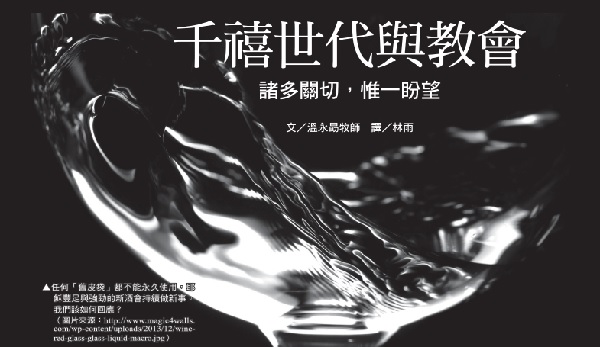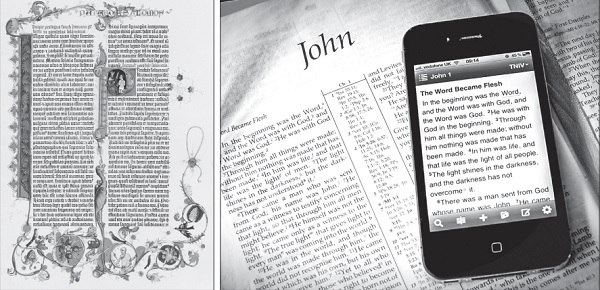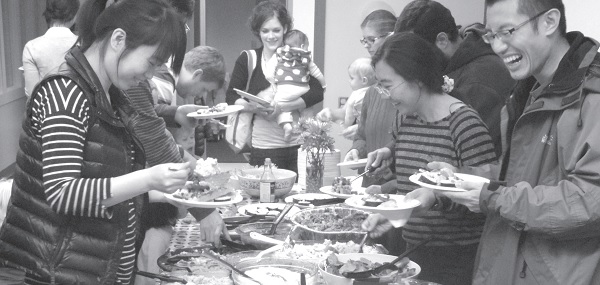Millennials and the Church
[The new look of the church in the M generation] Many concerns, but the only hope
Translated by Lin Yu

要寫篇關於千禧世代的文章頗有難處。首先,無法確定是否以偏概全;其次,要分辨所觀察的到底是千禧世代獨特之處,抑或只是全球化發展過程中一種廣泛的轉變,或觸及所謂「近現代」1 的部分現象,並非易事。
At the same time, it may be cliché in Christian circles to invoke the biblical metaphor of “new wine and new wineskins” when talking about the millennium, or more broadly, the relationship between modernism and the church in recent times. However, this parable appears in three Synoptic Gospels (Synoptic Gospels, translation annotation: referring to the Gospels of Matthew, Mark, and Luke, also known as the Synoptic Gospels and Synoptic Gospels), and it is the most appropriate portrayal of what we have experienced so far. .
In answering the question about fasting, Jesus deliberately pointed out that religious customs cannot carry the new things that God is doing through Jesus. He said this:"Neither does anyone put new wine into old wineskins; for if that were the case, the wineskins would burst and the wine would leak out, and the wineskins would be ruined. But if you put new wine into new wineskins, both will be preserved." (Matthew 9:17, also see Mark 2:22, Luke 5:37-38)
當然,讀了這麼多關於年輕一代離開教會與信仰的統計數字,讓我們想到再這樣下去,是否「皮袋就裂開,酒漏出來,連皮袋也壞了」?2 各地教會在許多方面似乎與新興一代的文化感受格格不入,讓我們思考是否需要「新皮袋」(適應文化表現的教會新方式),來盛裝「酒」(耶穌和祂傳講的福音),好讓「兩樣都保全了」。
As we consider the relationship between the millennium and the church, just as this passage contains many concerns, we also see greater hope. We look forward to readers exploring together: Why should we be concerned? Where is the hope? We also hope that the evangelical church will continue to think and move forward on the path of transformation in this generation.
why concern
Do we need “new wineskins” for a new generation of Christians? All phenomena point to "yes". "The Church changes in order to remain the same." This Orthodox philosophical saying expresses the view that the Church needs to adapt to the times in order to maintain its influence. However, it must be careful not to change too much and lose the essence of the faith. There has been quite a bit of writing focusing on the uniqueness of the Millennial generation and why the church needs to change in order to serve this generation more effectively. 33
金大衛(David Kinnaman)用三個詞幫助我們總結千禧世代如何在這「間歇性相異」於之前三世代的大環境中成長─「取用」、「異化」、「權威」。4 金大衛所做的研究極為優秀,本文多少會重述他的論點,即使不完全一樣。他的分類能幫助很快歸納出如何關切千禧世代、千禧世代和教會的關係,以及他們與基督信仰的關係。我們要來看看「舊皮袋」─那些過時的特點或沿習的積弊,也尋索如何走向「新皮袋」。

▲Gutenberg’s printing technology popularized the Bible and triggered the Protestant Reformation. In the digital culture, what impact will the electronic version of the Bible bring? (The left is the Gutenberg Bible, the right is the mobile version of the Bible.)
(Source of left picture: http://library.sc.edu/zellatest/bible/images/Biblegutenberg.jpg)
(Source of the picture on the right: http://www.andyfuqua.com/wp-content/uploads/2014/08/DIgitalBible.jpg)
Use──
The invention of printing by Johannes Gutenberg in the 15th century can be said to be a key technological innovation in the transformation from oral culture to written culture. Through the printing press, the Bible could reach the masses, eventually igniting the Protestant Reformation and causing the relative effect of weakening papal authority. At the same time, printing built the modern world, and the guardians and gatekeepers of knowledge and information became a new authoritative class. For example, in the written culture of the past hundreds of years, universities symbolized the seat of the highest level of knowledge. Today, though, the symbol struggles to remain relevant and raise funds to survive. The starting point of the decline of universities should be the communication revolution that has gradually developed over the past sixty years. Especially in the past two decades, technological innovations from television, personal computers, the Internet to various new media have transformed culture from text to digital.
People of different generations are still experiencing this huge change to some extent, and are accepting or rejecting it to a certain extent. Millennials can be said to be the first generation to be "born and raised" in the digital world. 55
根據新澤西州普林斯頓(Princeton, NJ)的教育測試機構ETS(Educational Testing Service)最新研究發現,在新穎的數位化世界中,北美千禧世代淪為「世界最不靈巧的人之一」。6 我們即使對這樣的發現哀歎,也清楚其實很有道理。既然學生可以求助於先進的計算機或軟體,為何還要學習逐步解決一道數學難題?既然可倚賴衛星導航系統GPS(Global Positioning System),何必知道怎麼使用指南針和地圖?當Google和維基百科(Wikipedia)能隨時提供任何想知道或需要知道的訊息時,哪還有必要熱切吸取、消化知識?
In fact, this is also the reason why David Jin chose the word "take". Just as the printing press democratized knowledge in the past, the Internet has done so even more in today's era. Not just in terms of content, but also in connection (just like social media). People no longer just passively receive information, but also have the opportunity and privilege to participate in creation and publication (e.g. Wikipedia, WordPress, YouTube). As shopping malls democratize (think Craiglist, Amazon), so does the ability to speak out for good causes (Crowdfunding is one example). Regardless of whether it is good or bad, technological innovation and unprecedented leaps in the past two decades have caused the collapse of the modern written world.
Such a disintegration is noteworthy when it comes to the transmission of the Christian faith, because the "old wineskins" that are customary and continually used in church circles came to fruition in the age of writing. According to the predecessor Robert Webber (1924-1989), the written world values reading, writing, knowledge, analysis, discernment, explanation, logic, and linear thinking; while the digital world where millennials grew up emphasizes the first Hands-on experience, knowledge of immersive participation, visual shock (e.g. atmosphere, environment, space), restarting imagination and intuition, sensitivity to spiritual reality. 77
魏若博接著說:「現代福音派基督徒已全力使用語言和分析式溝通來接觸與他們同一世代的人。信心被解釋成一套思想體系,特點是內在融會貫通與合情合理。聖經分析化,神學系統化,屬靈生命律法化。」8 這樣的做法對千禧世代和之後的世代行得通嗎?這樣的方法是否至終要和文字時代一般,流逝而去?假若基督信仰與文字皮袋緊密相繫,千禧世代能否認同?

▲Are different generations willing to listen to each other’s voices and respect each other’s opinions?
(Image source: http://blogs.iriss.org.uk/reshapingcare/files/2011/10/young-and-old2.jpg)
Alienation──
千禧世代也面對一些矛盾的情況:9 他們經由社群媒體與他人緊密聯繫,卻獨自坐在房間裡盯著科技產品才能與人溝通;10 重視關係,慷慨,不過挺自戀;11 有許多泛泛之交,卻少有知己;12 極為自信,有遠大抱負,甚至想改變世界,卻缺乏長期委身追求成就的意願,也很少達到期望中的改變。他們從這一行跳到另一行時,也造成對志業的不確定。13
他們在非傳統家庭長大,或至少看到別人在非傳統家庭長大(金大衛指出,現今的孩子來自非婚父母的比率是嬰兒潮世代八倍之多。14),因此渴慕與上一輩建立更緊密的關係,只是這樣的連結仍然少見。同時,自信的他們對制式機構半信半疑,金大衛指出,年輕人是最不可能前往投票、擔任志工、參與社區活動的族群。15 另一個具多重原因、涵蓋多重層面的社會現象,就是千禧世代延遲成婚生子。16 事實上,很多人還拖長了青春期。17 以上都指向金大衛所說的「異化」。
我們的「舊皮袋」尊崇傳統核心家庭,使得那些單身、離婚、鰥寡,或是沒有孩子的人,在教會的教導和文化上受到冷落。不過何約瑟(Joseph Hellerman)指出在古老的新約時代,手足關係甚至比婚姻關係更重要,因此造成神的家庭中互稱弟兄姊妹的模式。18 換句話說,何約瑟強調新約把教會家庭看得比原生家庭更重要,這與現今大部分福音派架構大相逕庭。19
For the millennial generation, such a revised "new wineskin" can bring new opportunities, allowing young people who grew up in non-traditional families and have not yet started a family to feel comfortable in the "family" of the church, reversing their outsider mentality. Feelings provide a development environment for substantive relationships.

▲The early church valued the church family more than the family of origin. Will this be a challenge or opportunity for today’s church? (Image source: http://uvillage.nd.edu/assets/63474/original/potluck_joy.jpg)
Authority 20──
簡單來說,數位化時代營造出一種均等環境,讓年紀輕輕的千禧世代習慣有話就說,並常以提供意見表示參與。問題在於教會的「舊皮袋」多半組織與階級分明,而不給青澀的千禧世代一席之地。「新皮袋」要從閉塞的階級結構,朝向鼓勵參與、開放式的領導模式,營造會眾需要的參與感,好讓他們投身教會的宣教與事工。21 若非如此,許多千禧世代仍舊覺得無力,反倒攔阻了他們更多有意義、有果效地參與教會。
the only hope
雖然從上述的諸多關注中,觀察到諸多面對千禧世代及他們與教會的關係時,理當考量的議題,我們仍要提醒自己無需過度憂心。如同「新皮袋」的貼切比喻,在文化變遷時,實踐信仰與教會生活的方式也需隨之改變。從另一方面來看,強戴羅(Darrell Johnson)對這比喻提出一個不同的解讀。他建議在教會歷史的每個時期,面對教會發展的不同階段,都需要「新皮袋」。這不見得一定就是周圍文化變遷迫使我們得跟上潮流,反倒可能是因為「新酒」(耶穌基督)如此濃烈香醇,以致沒有任何表達信仰或教會的外在形式,足以長久承載而不致破損。22 這「新酒」過於豐美,沒有任何皮袋足以包裝,無可避免會出現裂縫,必得經歷更新。應用於崛起的新世代,新酒是我們的盼望。萬有之主耶穌基督也會親自建造教會,我們其實無需擔憂。"The gates of Hades shall not prevail." (See Matthew 16:18)
既然無需憂慮,我們只要認真探究以下兩個課題:第一,此時此地耶穌正在做什麼?第二,此時此地我如何參與祂正在做的事?23 這樣一來,我們一方面信靠耶穌動工,另一方面切實完成祂的心意(當然包括祂對千禧一代的心意)。如同耶穌描述天國的比喻:"And he said: The kingdom of God is like a man who sows seed on the earth. He sleeps at night and rises by day, and the seed sprouts and grows, but the man does not know how. The earth produces grain by nature: the seed sprouts first; Then the ears grew, and the ears became full of grain." (Mark 4:26-28)We faithfully sow, and Jesus “makes it grow” (see 1 Corinthians 3:6-7); we faithfully pour water, and Jesus turns water into wine (see John 2:1-11). We don’t need to worry too much about the millennium, because Jesus is constantly creating, redeeming, and sustaining His world. Because of this, He also wants to attract a new generation. Even if these grassroots original movements seem quite unfamiliar to those of us who are limited to the "old church style", this "old wine bottle" has begun to burst after all. twenty four 24
Ultimately, our call is to faithfully uphold Jesus Christ and His message as our only foundation (see 1 Corinthians 3:10-11). The danger of allowing ourselves to be dominated by secular culture and worrying about the current generation or letting future generations overly influence us is that it will lead to "cultural tolerance" and gradually replace the true foundation. Finally, such "works" will also reveal their destructive nature (see 1 Corinthians 3:12-15).
Yes, today’s generation needs “new wineskins” to contain “new wine” because “old wineskins” cannot last forever and cannot be used again. However, the source and motivation of "newness" lies in loyalty to Jesus Christ Himself and His message, not from our fear, worry, and concern for the new generation.
Our eternal "new wine" Jesus Christ is the source of our hope. If the church sincerely adheres to Christ and His message and words, "by nature", the millennium will still be saved. 25 Their “new wineskins” will hold “new wine” until His fullness and strength burst the wineskins for His next work. At this point, Jesus is still calling us to join in what He is doing.
(All data sources and author's notes are published in the English section of this issue on pages 10 to 14.)
 Author Profile Pastor Wen Yongxu is a senior millennial. He graduated from Wheaton College in Illinois, USA and Regent College in Vancouver, Canada. He was the youth pastor of Maryland Chinese Bible Church. In the fall of 2015, I will go to the University of Edinburgh, Scotland with my wife and two sons to study for a doctorate in theology, majoring in systematic theology. In the past few years, Pastor Wen has served students of all ages in North America and Taiwan, and he looks forward to further studying the intersection of faith doctrine and social ethics.
Author Profile Pastor Wen Yongxu is a senior millennial. He graduated from Wheaton College in Illinois, USA and Regent College in Vancouver, Canada. He was the youth pastor of Maryland Chinese Bible Church. In the fall of 2015, I will go to the University of Edinburgh, Scotland with my wife and two sons to study for a doctorate in theology, majoring in systematic theology. In the past few years, Pastor Wen has served students of all ages in North America and Taiwan, and he looks forward to further studying the intersection of faith doctrine and social ethics.
